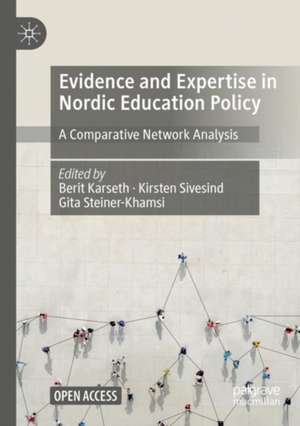Evidence and Expertise in Nordic Education Policy: A Comparative Network Analysis
Editat de Berit Karseth, Kirsten Sivesind, Gita Steiner-Khamsien Limba Engleză Paperback – 2 apr 2022
| Toate formatele și edițiile | Preț | Express |
|---|---|---|
| Paperback (1) | 360.15 lei 6-8 săpt. | |
| Springer International Publishing – 2 apr 2022 | 360.15 lei 6-8 săpt. | |
| Hardback (1) | 433.09 lei 6-8 săpt. | |
| Springer International Publishing – 2 apr 2022 | 433.09 lei 6-8 săpt. |
Preț: 360.15 lei
Nou
Puncte Express: 540
Preț estimativ în valută:
68.92€ • 72.28$ • 57.37£
68.92€ • 72.28$ • 57.37£
Carte tipărită la comandă
Livrare economică 01-15 aprilie
Preluare comenzi: 021 569.72.76
Specificații
ISBN-13: 9783030919610
ISBN-10: 3030919617
Pagini: 429
Ilustrații: XXIV, 429 p. 25 illus., 1 illus. in color.
Dimensiuni: 148 x 210 x 32 mm
Greutate: 0.54 kg
Ediția:1st ed. 2022
Editura: Springer International Publishing
Colecția Palgrave Macmillan
Locul publicării:Cham, Switzerland
ISBN-10: 3030919617
Pagini: 429
Ilustrații: XXIV, 429 p. 25 illus., 1 illus. in color.
Dimensiuni: 148 x 210 x 32 mm
Greutate: 0.54 kg
Ediția:1st ed. 2022
Editura: Springer International Publishing
Colecția Palgrave Macmillan
Locul publicării:Cham, Switzerland
Cuprins
Introduction: A Comparative Network Analysis of Knowledge Use in Nordic Education Policies.- What is in a Reference? Theoretically Understanding the Uses of Evidence in Education Policy.- Exploring the Architecture of Policy Knowledge: A Methodological Note.- Policy Borrowing and Evidence in Danish Education Policy Preparation. The Case of the Danish Public School Reform of 2013.- Evidence and Expert Power in Finnish Education Policy Making: The 2010‒2016 National Core Curriculum Reform.- The Irregular Formation of State Policy Documents in the Icelandic Field of Education 2013‒2017.- Structuring School Reform Policy With Evidence: The Inter-Mediational Role of Knowledge Sources and Arguments.- The Complexity of Context in Legitimating National School Reforms: The Case of Sweden.-
1. Evidence-based Policymaking in Nordic Countries: Different Settings, Different Practices?.- How Much is Policy Advice Changed and Lost in Political Translation?.- The OECD and the Field of Knowledge Brokers in Danish, Finnish, and Icelandic Education Policy.- Regional Policy Spaces, Knowledge Networks and the “Nordic Other”.- On Evidence, Impact, and Layers in Education Policy Processes.- Evidence-Based Policy Making and Educational Reform in Nordic Europe: Main contributions of the POLNET Study.- Conclusion: Toward a Renewed Understanding of Evidence-Based Policy in Education.Notă biografică
Berit Karseth is Professor in the Department of Education at University of Oslo, Norway. Her main research interests and publications lie in the fields of education policy, reforms, and curriculum studies.
Kirsten Sivesind is Associate Professor in the Department of Education at the University of Oslo, Norway. Beyond her academic discipline of curriculum theory, her research focuses on comparative policy analysis and the history of educational ideas and reform.
Gita Steiner-Khamsi is Professor of Comparative and International Education at Teachers College, Columbia University, USA. Her research interests focus on policy borrowing, comparative policy studies, public-private partnerships in education, and comparative methodology.
Kirsten Sivesind is Associate Professor in the Department of Education at the University of Oslo, Norway. Beyond her academic discipline of curriculum theory, her research focuses on comparative policy analysis and the history of educational ideas and reform.
Gita Steiner-Khamsi is Professor of Comparative and International Education at Teachers College, Columbia University, USA. Her research interests focus on policy borrowing, comparative policy studies, public-private partnerships in education, and comparative methodology.
Textul de pe ultima copertă
This open access book explores how policy makers draw on national, regional and international expertise in issuing school reform within five Nordic countries. In an era of international comparison, policy makers are expected to review best practices, learn from experiences from elsewhere, and apply international standards propelled by international organizations. Do they do so? What counts, for them, as evidence and expertise? The chapters draw methodologically on bibliometric data, network analysis, document analysis and expert interviews. They show compellingly how governments use “evidence” strategically and selectively for agenda setting and policy decisions. This book will be of interest and value to scholars of education policy, specifically within the Nordic region, and international and comparative education.
Caracteristici
This book is open access, which means that you have free and unlimited access Shows how governments cope with the pressure to use data and evidence for their policy decisions Is methodologically sophisticated in combining bibliometric network analysis, document analysis and expert interviews Brings together a group of prominent scholars on the much debated issue of evidence-based policy
